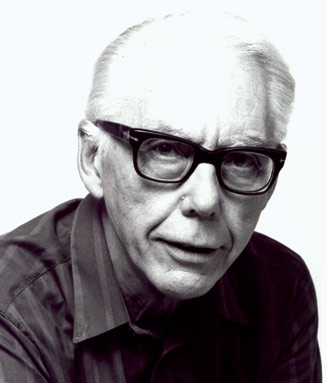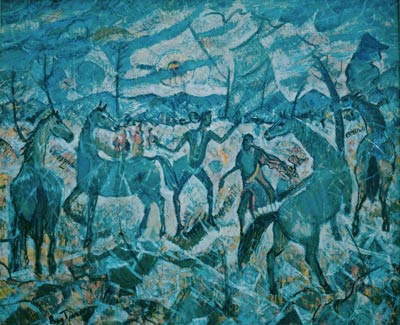BAFA © 2010. All material here is copyrighted. See conditions above. |
Lowell Johnson
radio DJ, writer, South Africa
|
 Lowell Johnson, 1987.
Lowell Johnson, 1987.
|
Born in South Dakota, U.S.A. in 1920, I pioneered with my wife Edith to Johannesburg, South Africa in 1953 and have lived there ever since. My writing came about because of a need here in South Africa. The Bahá´í literature available to us was too formal in style and the vocabulary was too difficult for many. So, although I originally came to South Africa to write a doctoral thesis I gave it up and discarded most words with more than two syllables!
And although I have occasionally lapsed into nostalgia about "what might have been" (I was preparing to work in the radio division of the UN Secretariat where I had done some previous research in the late 'forties), I have been rewarded a thousand times over for learning to reduce intellectualisms to simple communication and remained in the pioneering field in South Africa.
The role which my radio experience has played in all this is in the aural style of writing which all my books have developed into. Essentially, everything I have published has been written to be read aloud.
|
That's because the first books were the life-story of Baha'u'llah ("Remember My Days") and the stories of Tahirih, Quddus and Mulla Husayn ("Three Golden Crowns"). These were first recorded in the 'sixties in Cape Town on "reel-to-reel" tape and used all over Southern Africa for deepening and inspiration (story-telling is a way-of- life amongst Africans). From that beginning they were transferred word- for-word to booklet form and spread around the world, not only in the Third World but read by Western children, youth and parents - or used as quick review.
|
 ...image to come...
...image to come...
|

image to come
|
I have never written a book or anything else unless there was a definite need - I'm too lazy. One book on "The Eternal Covenant" grew out of a glaring need to state the Covenant simply in our African teaching work and to integrate obedience to the Covenant with the Laws and Administration and spiritual growth. The book had one chapter on the Guardian. From that chapter I discovered that the Africans knew very little about Shoghi Effendi, so the result was "Our Beloved Guardian", to fill that need.
|
Earlier on, in 1968, at the time of the passing of the South African artist, Reginal Turvey, referred to by the Guardian as "The Father of the Bahá´ís of South Africa", I was asked by Roger White to write an appreciation of him for Bahá´í World (Volume XIV) which I did. After it appeared, David Ruhe showed such an interest in Turvey's art and life that we decided there was a need to present a picture of Turvey to the non-Bahá´í world as well as the Bahá´ís. So, I spent 12 years researching the eminent Turvey family background and the importance of his art with the help of Bernard Leach who understood it deeply and had befriended and encouraged Turvey throughout his sixty years of painting.
|

|

image to come
|
In 1990 as the Faith was coming out of obscurity in South Africa, the politically active young people were hearing of the Bahá´í Faith for the first time, and were asking the question, "Where were the Bahá´ís during the struggle?" , meaning Why weren't the Bahá´ís opposing the apartheid regime? This was a difficult question to answer in a sentence or two, because the Bahá´ís were asked by the Guardian to remain in obscurity while it was still young. So, there was a need to explain the development of the racially united Bahá´í community as it evolved in an environment totally opposite that of South African custom and policy. The need was filled by going into my extensive photograph collection over the years and the national archives, and with the assistance of a master photographer and his wife. Publishing "A Pictorial History of the Bahá´í Faith 1911-1992" filled another need.
|
I have often thought of many subjects for books and have toyed with the idea of being a "creative writer", but there was never a compelling need for them, so they were shelved. Recently I completed two other needs - a book of short biographies of the ten year crusade teachers and a diary history of the Ten Year Crusade in Southern Africa (Bahá´í activities in 15 countries and islands from 1953 to 1963). Why was it a need for me to do this? Because there is no one else left who has the background and the time. I started working on this research several years ago. Last year it reached the stage where it needed full-time concentration if it were ever to be completed.
|
 ...image to come...
...image to come...
|
So, with the added stimulus of two slipped discs, I resigned from the National Spiritual Assembly (after 33 years) and have combined with Edith Johnson to complete the job. I am now working on a biography of Michael Sears, younger son of Hand of the Cause William Sears, who was the first youth to pioneer to Africa.
Books by Lowell Johnson: The Eternal Covenant; Remember My Days (the life-story of Baha'u'llah);
Three Golden Crowns, stories about Tahirih, Mulla Husayn, and Quddus; Reginald Turvey/Life and Art (1986, George Ronald, Oxford, U.K.); A Pictorial History of the Bahá´í Faith in South Africa 1911 to 1992.
And the Cdrom: Heroes and Heroines of the Ten Year Crusade, a Ten Year Crusade Diary for Southern Africa.
|

|
The Spiritual Side of Dizzy
by Lowell Johnson
...I first met Dizzy in 1963 in England. I was attending the first Bahá´í World congress at Albert Hall in London, and was invited to attend a press conference in honour of Dizzy and other jazz musicians who would be part of a jazz festival...
To the rest of the article
|
- Review: South African Arts Festival, Arts Dialogue September 1995
- Announcement: His book, A Pictorial History of ..., BAFA newsletter, December 1994
- Letter: A Tribute to Dizzy Gillispie, BAFA newsletter, December 1993
- Letter: About African Dance, BAFA newsletter, September 1993
- Response to his letter: by Alison Marshall, BAFA newsletter, September 1992
- Letter: about how he is not an artist, BAFA newsletter, June 1992
|

Arts Dialogue, Dintel 20, NL 7333 MC, Apeldoorn, The Netherlands
email: bafa@bahai-library.com
|
|
 Lowell Johnson, 1987.
Lowell Johnson, 1987.
 ...image to come...
...image to come...


 ...image to come...
...image to come...